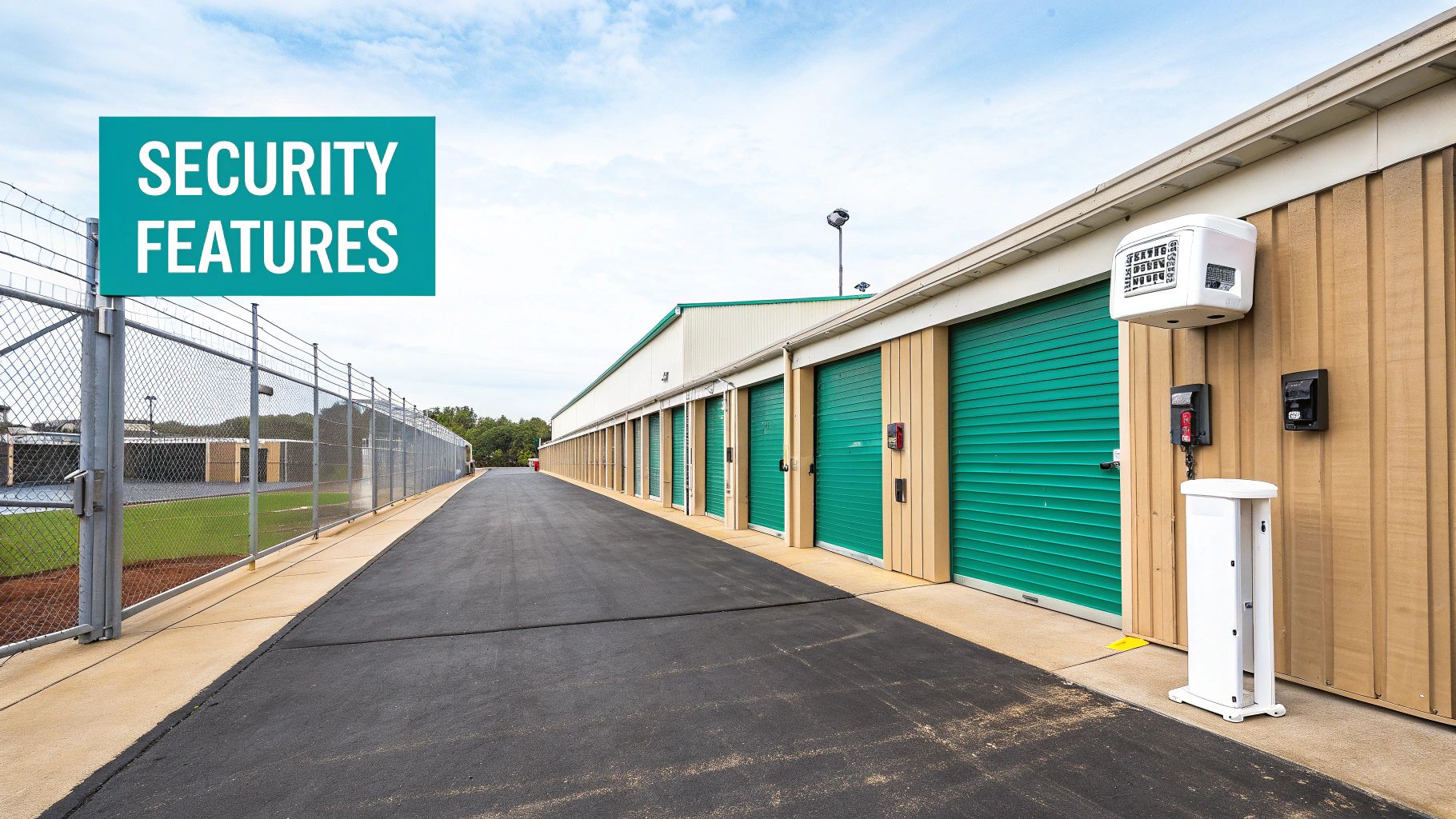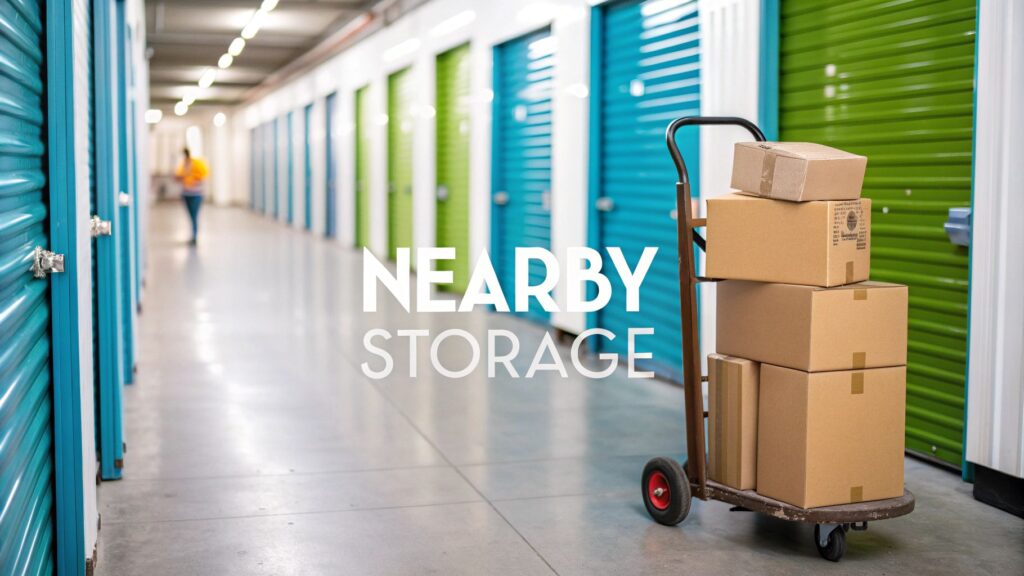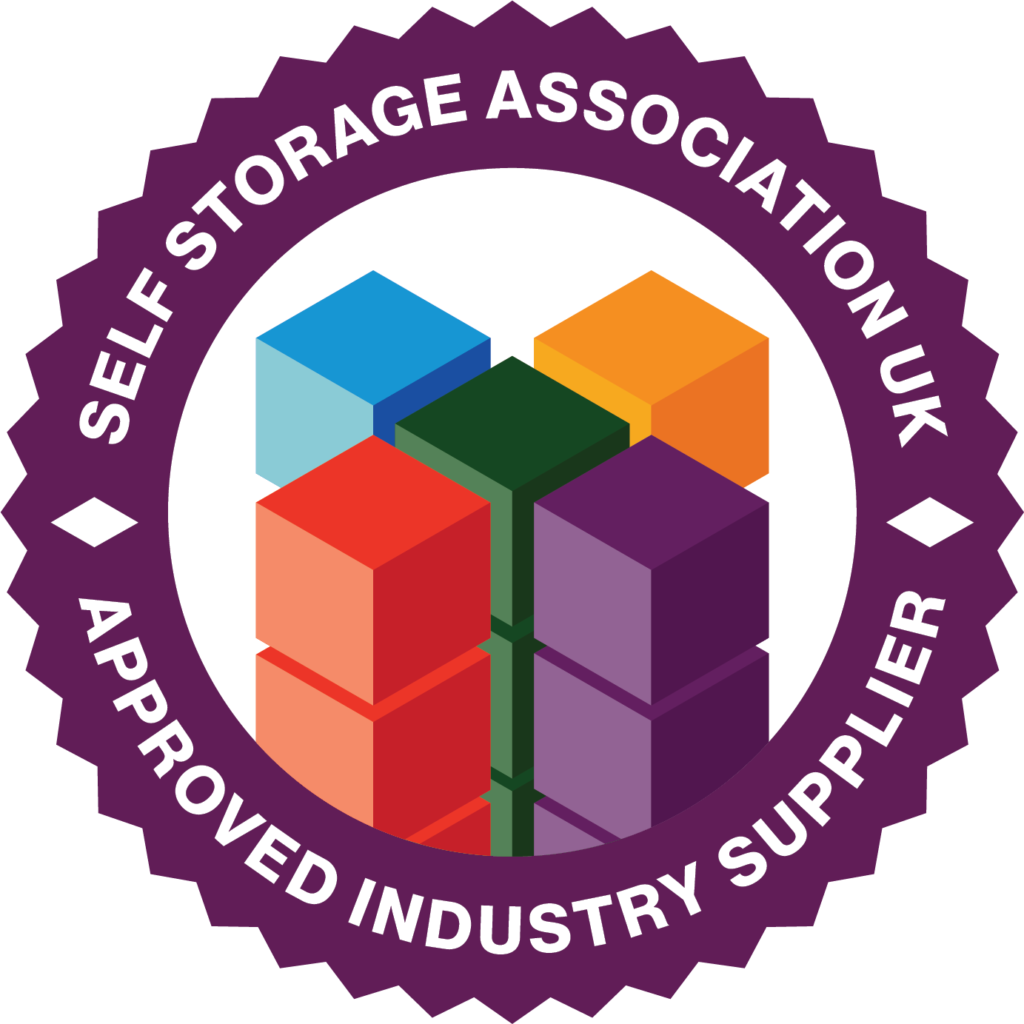Feeling squeezed for space? It’s a common story. Whether you're decluttering, stuck in the middle of a house move, or need somewhere to stash business stock, the hunt for storage solutions near me across the Wirral can be a real headache. This guide is your practical, local companion, designed to cut through the noise and show you exactly what to look for—from picking the perfect unit size without overpaying to knowing which security features genuinely matter.
Your Guide to Finding the Right Local Storage
Finding the right self-storage isn't just about stashing boxes away; it’s about getting some peace of mind and creating more breathing room in your life or business. But the process can feel overwhelming. A quick local search throws up dozens of facilities, each offering different features, prices, and promises. Forget the generic advice. This is a focused walkthrough for Bromborough and Wirral residents, packed with real-world tips to help you compare your options and book a storage unit with complete confidence.
The need for flexible storage has shot up as our homes and businesses evolve. What often starts as a temporary fix during a house move can easily become a long-term solution for managing seasonal bits and bobs, business inventory, or cherished possessions that just don’t fit the current floor plan. Realising you need extra space is the easy part; the challenge is making an informed decision that balances cost, convenience, and security.
Why a Localised Approach Matters
Typing "storage solutions near me" into a search engine isn't just about finding the closest pin on a map. A local facility right here in Bromborough offers distinct advantages that a more distant, slightly cheaper option might not.
- Convenience is Key: Being close by means you can easily drop off or pick up items without it turning into a major expedition. This is a game-changer for business owners needing daily access to stock or for anyone tackling a gradual decluttering project.
- Understanding Local Needs: A Wirral-based provider gets it. They'll understand regional concerns, like the need for solid damp protection against our lovely local climate.
- Supporting the Local Economy: Choosing a nearby facility means you’re keeping your investment right here in the community.
A great storage solution should feel like a seamless extension of your home or business. It needs to be secure, accessible, and straightforward—not a chore to visit. The goal is to find a space that works for you, not the other way around.
Before you commit, it’s also worth exploring how to maximise the space you already have. For some brilliant ideas on that front, these 10 essential storage solutions for small spaces are a great read. This guide, however, is all about finding that perfect off-site space right on your doorstep.
Choosing the Right Size Storage Unit
Picking a storage unit that’s too big is one of the quickest ways to waste money. On the flip side, cramming your belongings into a unit that’s too small is a recipe for pure frustration and the hassle of having to upgrade later. The key is to move beyond guesswork and find a space that’s just right, whether you’re storing the contents of a two-bedroom flat or managing stock for your online business.
Getting it right from the outset gives you the confidence to know whether you need a compact 25 sq ft locker or a more generous 100 sq ft unit. It's a common dilemma, which is why the UK self-storage industry is growing so fast. In fact, total available space shot up by 7.2% last year alone, reaching a massive 64.3 million square feet. This surge shows just how many people are looking for flexible space for house moves, renovations, or business needs.
Accurately Estimating Your Space
Instead of just winging it, taking a more methodical approach will save you both money and a headache down the road.
Start by doing a quick inventory of everything you plan to store. Jot it all down, grouping items into categories like furniture, boxes, appliances, and any odds and ends. This simple list is your foundation for a much more accurate estimate.
To give you an idea, a typical 50 sq ft unit – roughly the size of a large garden shed – can comfortably hold the contents of a one-bedroom flat. Think a sofa, a double bed, a chest of drawers, and about 15 to 20 medium-sized boxes. For a small business, that same space could hold around 80 to 100 stock boxes.
The easiest way to nail down the exact size you need is to use an online storage calculator. These handy tools let you punch in your furniture and the number of boxes you have, then give you a solid recommendation. To get a precise estimate for your belongings, check out our detailed guide and use our storage unit size calculator.
When you're searching for local storage, always remember the big three: size, security, and access.

Finding the perfect spot is all about balancing these three elements – getting the right dimensions while making sure your stuff is safe and you can get to it when you need to.
Common Storage Unit Sizes and What They Hold
To help you visualise what fits where, here’s a quick reference guide to the standard self-storage units you'll find locally.
| Unit Size (sq ft) | Roughly Equivalent To | Ideal For Storing |
|---|---|---|
| 25 sq ft | A large walk-in wardrobe | The contents of a garden shed or a student room, several boxes, small furniture. |
| 50 sq ft | A large garden shed | The contents of a one-bedroom flat, including a sofa, bed, and multiple boxes. |
| 75 sq ft | A Luton van | The contents of a two-bedroom flat or small house, plus appliances and boxes. |
| 100 sq ft | A single garage | The contents of a two-bedroom house, including garden furniture and large items. |
| 150 sq ft | A garage and a half | The contents of a three-bedroom house or for small business inventory storage. |
This table should give you a better feel for the space you’ll be working with, but remember that smart packing can make a huge difference.
Maximising Every Square Foot
Once you’ve chosen your unit, clever packing is the secret to making every inch count. It’s not just about the floor area; that vertical height is valuable, often-overlooked real estate.
Think of packing your storage unit like a game of Tetris. The goal is to fit everything in securely with no wasted space. Dismantle furniture, stack boxes strategically, and you'll be amazed at how much a smaller unit can hold.
Here are a few practical tips to help you pack like a pro:
- Go Vertical: Stack sturdy, heavier boxes at the bottom with lighter ones on top. This makes full use of the unit's height and keeps your items stable.
- Dismantle Furniture: Take apart anything you can – bed frames, tables, shelving. Pop all the screws and small parts into a labelled bag and tape it securely to the largest piece so nothing gets lost.
- Create an Aisle: This is a game-changer. Leave a narrow walkway down the middle of your unit. It might seem like you're losing space, but it means you can actually get to the items at the back without having to empty the entire unit first.
Comparing Wirral Storage Features That Matter
Once you’ve got a rough idea of the unit size you need, it's time to dig into what different facilities really offer. It's a mistake to think all storage is the same, especially when you're searching for “storage solutions near me” here in Bromborough. The little details, from when you can get to your stuff to how well it’s protected, can make or break your whole experience.
Looking past the monthly price tag is crucial. A slightly cheaper unit is no bargain if it lacks the proper security for your valuables or access hours that just don't fit your life. The real goal is finding that sweet spot: convenient, secure, and the right environment for whatever you're storing.

Access Hours vs Your Schedule
One of the first things I always tell people to check is a facility's opening times. What you need really depends on your own routine.
- Standard Hours (e.g., 9 am – 5 pm): This often works just fine if you're managing a house move or decluttering. Most of your visits will be planned during the day anyway.
- 24/7 or Extended Access: This is a total game-changer for business owners who need to grab stock late at night. The same goes for tradespeople who have to pick up tools and equipment before the sun comes up for an early job.
Honestly, think about your lifestyle. If you work odd hours or know you'll need to pop in at the last minute, a facility with longer opening times or round-the-clock availability isn't a luxury—it's a must.
Security That Offers Real Peace of Mind
Security is one area where you should never compromise. Your belongings are important, so you want a place that uses several layers of protection to keep everything safe and sound.
A solid security setup should include:
- High-Definition CCTV: Cameras should cover all the key spots—entrances, exits, hallways—and they need to be running 24/7.
- Secure Perimeter Fencing: A strong, well-kept fence is your first line of defence against anyone who shouldn't be there.
- Controlled Gate Access: Look for keypad entry systems. They make sure only paying customers can get onto the site.
- Individual Unit Alarms: While not every facility has them, this adds a huge layer of personal security. It alerts staff if anyone tries to tamper with your specific unit.
When you store your items, you're putting your trust in someone else. Top-tier security isn't just a nice-to-have; it's fundamental for your peace of mind. Don't settle for less.
The Importance of Climate Control on The Wirral
Let's face it, the damp Wirral climate can be tough on sensitive items. While a standard unit will keep your things dry, climate-controlled storage takes it a step further by maintaining a consistent temperature and humidity level. This is absolutely vital for preventing damage like mould, mildew, warping, and rust.
Before you choose, it's worth understanding the benefits of climate-controlled storage. It’s essential for things like:
- Wooden Furniture: Stops wood from warping, splitting, or cracking.
- Electronics: Protects delicate circuits from moisture damage.
- Important Documents & Photos: Keeps paper from degrading or sticking together.
- Upholstery and Fabrics: Prevents mould and mildew from taking hold.
This feature is becoming more and more common as people realise how valuable it is. Today, about 3% of the UK population uses self-storage, a massive jump from just 1.29% in 2018. It shows just how much these solutions are becoming a normal part of life. And it’s not just for boxes and furniture; if you need a secure spot for something bigger, our guide to caravan storage explains how we keep vehicles safe from the elements, too.
Getting to Grips with Storage Costs and Contracts
Figuring out the true cost of a storage unit can feel a bit like peeling an onion. The advertised monthly price is just the first layer, and several factors will influence what you actually end up paying for that "storage near me" you’ve been looking for. Getting the best value means looking beyond the headline offer.
The monthly rent comes down to three main things: the size of the unit, its location, and how long you plan to stay. A larger unit right here in Bromborough will naturally cost more than a smaller one a bit further out. Likewise, a short-term rental might have a higher weekly rate compared to a longer commitment.
What’s Really Behind the Price Tag?
The good news is that the self-storage market in the UK is really competitive. National occupancy rates are sitting strong at around 75.1%, and while the average rental rate has climbed to about £29.13 per square foot per year, this competition keeps prices from getting out of hand. You can find more insights in the latest UK self-storage market report from Cushman & Wakefield.
This healthy market also means facilities often run introductory offers to bring in new customers. Deals like "first month for £1" are pretty common and a great way to lower your initial costs.
A fantastic introductory deal is only a good deal if the standard price afterwards still fits your budget. Always ask what the rate will be once the promotion ends.
When you're comparing local options, make sure you're comparing apples with apples. A slightly higher price at one place might include insurance or a high-security lock, which could offer better overall value than a cheaper, bare-bones alternative down the road.
Don't Skip the Small Print
Your rental agreement isn’t just a formality—it’s a crucial document that outlines your rights and responsibilities. Spending ten minutes reading it through can save you from some nasty surprises later on.
Keep an eye out for these key details:
- Hidden Fees: Look for any one-off administration charges, cleaning fees, or compulsory lock purchases. These little costs can definitely add up.
- Insurance Requirements: Most facilities will require you to have insurance. Some offer their own policy, while others are happy to accept proof of cover from your home contents insurance. It's best to clarify this upfront.
- Notice Period: The majority of contracts require a notice period, usually 7 to 14 days, before you can move out. If you forget to give proper notice, you could end up being charged for an extra week or month.
- Rent Increases: The contract should spell out how and when your rent might go up. Some facilities review their prices annually, so it's good to know what to expect if you're planning a long-term stay.
By getting your head around these elements, you can confidently choose a storage solution that’s not just secure and convenient, but also transparently priced. No one likes an unexpected bill.
Your Stress-Free Moving-In Day Plan
You’ve booked your storage unit, which is a huge step. Now for the final piece of the puzzle: moving day itself. A little bit of smart organisation at this stage can be the difference between a day of chaos and a smooth, efficient process. It’s all about having a solid plan so you’re not scrambling for packing tape or making last-minute decisions under pressure.

Honestly, the key is to treat it like a mini-project. Get your materials sorted in advance, pack everything with a clear strategy, and have a simple plan for loading your vehicle and the unit. This kind of foresight makes all the difference when you pull up to your Bromborough storage facility.
Gathering Your Packing Essentials
Before a single item goes into a box, make sure you have the right tools for the job. I’ve seen it all—people using flimsy boxes or cheap tape, and it almost always ends in frustration and sometimes broken belongings.
Here’s your essential packing kit:
- Sturdy, uniform boxes: Using boxes of a similar size isn’t just about looking neat; it makes stacking them inside the unit much safer and more stable.
- Strong packing tape: Don’t skimp here. Good quality tape is what stands between your belongings and the floor.
- Bubble wrap and packing paper: Be generous with this stuff, especially for fragile items like glassware, electronics, and picture frames.
- Marker pens: Label every single box with its contents and which room it came from. A big, bold "FRAGILE" is a must for anything delicate.
Packing with a Storage Mindset
Packing for storage is a bit different from just packing for a direct house move. You have to think about long-term protection and, crucially, easy access down the line. A simple tip is to create an inventory list as you go; trust me, it’s invaluable when you’re trying to find one specific box months later. Our guide on using storage when moving house has loads more detail on this.
For wooden furniture, wrap it in old blankets or proper protective covers to stop scratches and dust build-up. If you still have the original boxes for delicate electronics, use them—they were designed to offer the best protection.
Think of your future self when you’re packing. What might you need to grab first? Keep those items separate and plan to load them in last. That way, they’ll be right at the front of your unit, ready to go.
Executing a Smooth Move-In
On the day, a bit of logistical planning ensures everything runs like clockwork. Double-check you have your access code handy and confirm the facility's opening hours one last time.
When you start loading your unit, follow this simple but effective strategy:
- Heavy Items First: Get the big, heavy stuff like furniture and appliances loaded in first. Place them at the back of the unit and along the walls to create a solid base.
- Create a Walkway: If your unit is big enough, try to leave a narrow aisle down the middle. This is a game-changer for reaching items at the back without having to unpack the whole unit.
- Stack Safely: Heavier boxes go on the bottom, lighter ones on top. It seems obvious, but it’s easy to forget in the rush. Avoid making the stacks too high to prevent them from toppling over.
- Frequently Accessed Items Last: Anything you know you’ll need soon—seasonal decorations, specific documents, maybe some tools—should be placed right at the front for easy retrieval.
Following this plan helps you get the most out of your space efficiently, making your search for "storage solutions near me" a truly successful and stress-free experience from start to finish.
Common Questions About Wirral Self Storage
Deciding on the right storage is a big step, and it's completely normal to have a few questions before you commit. To save you some time, we’ve put together the answers to the queries we hear most from people searching for storage here on the Wirral. Getting everything clear from the start means no nasty surprises later on.
What Items Am I Not Allowed to Store?
Every reputable storage facility puts safety and legality first, which means some things are strictly off-limits.
Generally, you can't store anything flammable or hazardous. Think petrol, paint, gas canisters, or fireworks. Perishable food is another big no-no, as it can attract pests and create a real mess. And of course, anything illegal is forbidden, along with weapons, live plants, or animals. It’s always best to have a quick chat with your chosen Bromborough facility to check their specific policy before you get packing.
Do I Need My Own Insurance for Stored Goods?
This is a really important one, and the answer isn't always the same. Some storage providers handily include a basic level of insurance cover in their monthly price. Others will ask you to either buy a policy directly from them or show proof that your belongings are already covered by your home contents insurance.
Before you sign on the dotted line, you absolutely must clarify the insurance situation. Make sure your belongings are protected for their full value against risks like fire, theft, or water damage. It's the only way to get complete peace of mind.
A smart first move is to ring your home insurance provider. A quick call will confirm whether your policy covers your goods while they’re in storage.
How Much Notice Is Needed to Leave?
Flexibility is one of the best things about self-storage, but there's still a process to follow when you’re ready to move out. Most places ask for between 7 and 14 days’ notice, but this will always be laid out clearly in your rental agreement.
Knowing your notice period is key to avoiding an extra week's or month's charge after you've already emptied your unit. We always suggest giving notice in writing – a simple email is perfect – so you have a dated record of your request. It's a small step that prevents any misunderstandings.
Can I Access My Storage Unit at Any Time?
Access hours can be a real deal-breaker and often vary between facilities. Some of the more premium spots offer 24/7 access, which is brilliant for business owners managing stock at odd hours or anyone with a hectic schedule.
Other places might have set opening times, like 8 am to 6 pm. Before you sign up, have a good think about when you'll realistically need to get to your things. Make sure the facility’s hours fit your life, not the other way around, to avoid any frustration.
Ready to find a secure, flexible, and affordable space for your belongings? At Shield Self Storage, we make finding the right storage in Bromborough simple and stress-free. Get an instant quote and book your unit online today. Find your perfect storage solution with Shield Self Storage.



